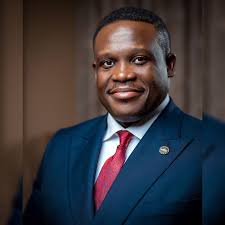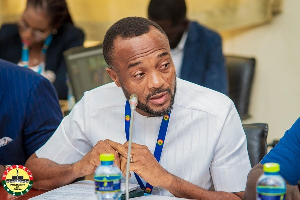Ghana’s Minister for Communications, Digital Technology and Innovations, Hon. Sam George, has announced a comprehensive post-training support plan for participants of the government’s One Million Coders initiative.
According to him, the programme is not just a training exercise, but part of a grander national strategy to position Ghana as Africa’s leading hub for artificial intelligence, business process outsourcing (BPO), and tech-driven innovation under the leadership of President John Dramani Mahama.
“So this is not just a knee jerk public policy stunt. It’s part of a bigger picture, and that’s why from my vetting I spoke about President Mahama’s vision to make Ghana the AI hub for the continent”
Hon. Samuel Nartey George, Minister for Communications, Digital Technology
The Minister emphasized that the initiative is deeply connected to the President’s vision of building a 24-hour economy that integrates technology into national development, creates employment, and encourages innovation across sectors.

Speaking about the structure of the initiative, Hon. George stressed that it is a long-sighted public policy, carefully curated and model designed to build a tech-driven Ghanaian economy.
He explained that Ghana’s approach was informed by a detailed study of Mauritius, a country with a population size similar to Tema, yet home to the headquarters of several major global tech firms. Ghana, he argued, has the potential to emulate and surpass this model by creating the environment that attracts outsourced jobs and global investments.
“When I engaged the Mauritian ICT and Finance Minister, they said to me, ‘Mauritius is willing to take 5,000 Ghanaians. Give them to us. We’ll give them work permits because we have more outsourced jobs than we have capacity to do.’
“And I said, ‘we’re not gonna send you the people. Bring those jobs to us here’”
Hon. Samuel Nartey George, Minister for Communications, Digital Technology

BPO and 24-Hour Economy
Hon. George pointed out that Ghana’s 24-hour economy, a central pillar of President Mahama’s second administration, is aligned with the BPO sector’s operations model.
The global BPO industry was valued at approximately $484 billion as of 2024, and Ghana’s entry into this market, according to the minister, would “create thousands of jobs and tech-led opportunities.”
“You look at our 24 hour economy policy and the fact that you wanna run three shifts – you need to have BPOs running here,” he asserted.
He recalled a previous success under President Mahama’s first term, where a U.S. company offering backend services to the New York Police Department operated its tech support centre from Ghana.
That legacy, he said, proves that global outsourcing is not new to Ghana, but needs scaling.
Hon. George revealed that the government anticipates that at least 10,000 out of the trained one million coders will initiate their own startups, and these enterprises will receive “structured government support” to grow and scale.
“That’s why the ministry under my watch is pioneering the Innovation and Startup Bill. It’s almost done, thanks to our partners from GIZ, from FCDO, who are helping us to put this together”
Hon. Samuel Nartey George, Minister for Communications, Digital Technology
The Innovation and Startup Bill will provide a legal and regulatory framework to guide Ghana’s emerging tech ecosystem, thereby attracting venture capital and global interest. Through this bill, the government plans to formalize incubation and acceleration support for startups.

From Incubation to Acceleration
The model outlined by the minister involves selecting promising startups, enrolling them in innovation incubators to test their concepts, and then transitioning them into accelerators using both government and private sector funds.
“It’s a partnership between the government and the private sector. You remember the $50,000,000 fintech fund? That fund is gonna be used to move them from innovation incubators into the accelerator program”
Hon. Samuel Nartey George, Minister for Communications, Digital Technology
He explained that the innovation incubators serve as a proving ground to test startup viability, and those with successful concepts would be assisted with business advisory services and funding to scale into full-fledged enterprises.
Hon. George also noted that the long-term vision includes exporting Ghana’s tech talent across Africa and beyond, effectively positioning the country as a hub not only for tech development but also for skilled human resources.
“We’re not looking at just using the innovation and startup ecosystem to create a stream of at least 10,000 startups, but it’s also to be able to export this human resource”
Hon. Samuel Nartey George, Minister for Communications, Digital Technology
READ MORE: Stage Set For Pharmaceutical, Semiconductor Tariffs





















